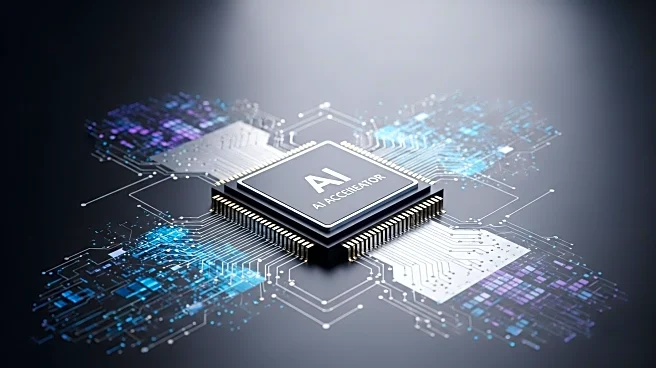What's Happening?
Broadcom CEO Hock Tan announced a partnership with OpenAI to build and deploy 10 gigawatts of custom artificial intelligence accelerators. This collaboration is part of a broader initiative to scale AI across various industries. Tan highlighted the potential for AI to significantly increase its share of global GDP, which currently stands at approximately $110 trillion. He predicts that the technology-intensive sectors, which account for 30% of the GDP, could grow to 40% with the integration of generative AI, adding $10 trillion annually. Broadcom, a major supplier of chips and networking equipment, has seen its stock rise by 53.86% due to the AI boom, with shares surging 9.88% following the partnership announcement.
Why It's Important?
The partnership between Broadcom and OpenAI signifies a major step in the expansion of AI technology, which is poised to become a larger component of the global economy. As AI continues to evolve, industries reliant on technology are expected to benefit significantly, potentially reshaping economic landscapes. Broadcom's involvement in AI chip development positions it as a key player in this transformation, with substantial orders from major cloud customers. The collaboration with OpenAI, a leader in foundation models, underscores the strategic importance of AI in driving future economic growth and innovation.
What's Next?
Broadcom's partnership with OpenAI is likely to catalyze further developments in AI technology, with potential implications for various sectors. As the deployment of AI accelerators progresses, industries may experience increased efficiency and innovation. The collaboration could also prompt other tech companies to pursue similar partnerships, intensifying competition in the AI space. Stakeholders, including businesses and policymakers, will need to adapt to the evolving landscape, considering the economic and societal impacts of AI integration.
Beyond the Headlines
The expansion of AI technology raises ethical and legal considerations, particularly regarding data privacy and security. As AI becomes more integrated into daily life, there will be increased scrutiny on how data is managed and protected. Additionally, the shift towards AI-driven economies may lead to workforce changes, necessitating new skills and training programs. Long-term, the partnership could influence global tech policies and standards, shaping the future of AI development and application.











